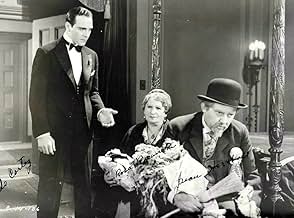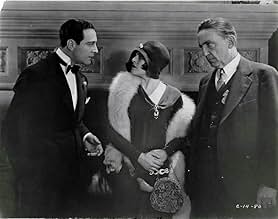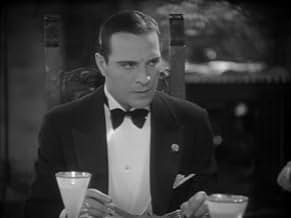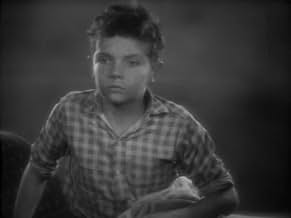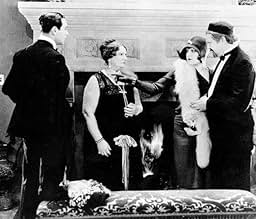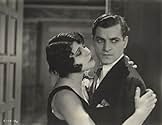अपनी भाषा में प्लॉट जोड़ेंSoap-opera about a social-climbing Jewish man and his old-world parents who are heartbroken by his rejection of them.Soap-opera about a social-climbing Jewish man and his old-world parents who are heartbroken by his rejection of them.Soap-opera about a social-climbing Jewish man and his old-world parents who are heartbroken by his rejection of them.
- निर्देशक
- लेखक
- स्टार
Syd Crossley
- Goldfish's Butler
- (as Sid Crossley)
Joe Bordeaux
- Crook
- (बिना क्रेडिट के)
Ferike Boros
- Delancey Street Woman
- (बिना क्रेडिट के)
Clarence Burton
- Police Desk Sergeant
- (बिना क्रेडिट के)
Paul Ellis
- Crook
- (बिना क्रेडिट के)
Ruth Feldman
- Market Woman
- (बिना क्रेडिट के)
Otto Fries
- Tradesman
- (बिना क्रेडिट के)
Julia Swayne Gordon
- Mrs. Striker
- (बिना क्रेडिट के)
Donald Hall
- Minor Role
- (बिना क्रेडिट के)
Leon Janney
- Eddie Lesser as a Boy
- (बिना क्रेडिट के)
Julanne Johnston
- Irma Striker
- (बिना क्रेडिट के)
Virginia Marshall
- Birdie Goldfish as a Girl
- (बिना क्रेडिट के)
फ़ीचर्ड समीक्षाएं
10mmipyle
Watched "The Younger Generation" (1929) with Jean Hersholt, Lina Basquette, Ricardo Cortez, Rosa Rosanova, Rex Lease, Syd Crossley, and others. Concerning a Jewish family from NYC's lower east side. Directed by Frank Capra, this is silent with three short talkie sequences and a music and sound effects overlay otherwise. Hersholt is content in his surroundings, and loves to joke and laugh and be merry with fellow street hawkers, while his wife, Rosanova, wishes to move up and out of the life they're in. Son Cortez is already hawking newspapers and making money at a very young age, set to rise out of this life and onto Fifth Avenue. His sister, Basquette, is the apple of her father's eye, and she is enamored of a young harmonica player, Lease. He wishes to become a song writer. Cortez and he are at odds from early childhood. As years pass, Cortez becomes ultra successful and moves, taking his family with him, up to Fifth Avenue and tremendous wealth. But the happiness that was seemingly inherent in most of the family is now barred by a steely front of money and vapid social status. Eventually, Cortez actually snubs his family, calling them foolish servants in front of invited wealthy acquaintances so that he won't have to admit that they're his parents. His parents are shattered. The scene is shattering! The final scene, after several circumstances with Lease and Basquette in-between, is also shattering. How Cortez is situated at the end is monumentally shattering.
This moral fable is brilliantly executed by all involved. For me, this was the best performance I've ever seen Cortez give. I was bothered near the beginning with some of Cortez' hand placements which reminded me too much of stage performing and less of film acting. Other than that, the other performances are nothing short of great. The film, though possibly not for everybody, especially if you're turned off by moral fables, is revelatory for the period. It will instantly remind many of "His People" (1925) with Rudolph Schildkraut if any are familiar with that silent; they're nearly the same story, and, curiously enough, Rosa Rosanova is in both films. The film's Jewish circumscription is felt through and through, and Capra has obviously purposely made that choice. The ethnic aura makes the film even more compelling. The prayer that Hersholt prays near the end is supremely moving in context, and the resulting events are the threading of the needle sewing the coming tapestry.
Simply outstanding! The print was also nearly perfect, and the sound was actually well done for 1929. The talkie sequences don't necessarily add anything special to the film, but must have been very satisfying to audiences when the film was released. The sequences don't seem to be like other goat-glanded films of the era, but the sound is used in conjunction with the rest of the film. The final sequence before the very end scene is sound. The end scene itself, which is profoundly silent, is tremendously moving because of its silence. Highly recommended!
This moral fable is brilliantly executed by all involved. For me, this was the best performance I've ever seen Cortez give. I was bothered near the beginning with some of Cortez' hand placements which reminded me too much of stage performing and less of film acting. Other than that, the other performances are nothing short of great. The film, though possibly not for everybody, especially if you're turned off by moral fables, is revelatory for the period. It will instantly remind many of "His People" (1925) with Rudolph Schildkraut if any are familiar with that silent; they're nearly the same story, and, curiously enough, Rosa Rosanova is in both films. The film's Jewish circumscription is felt through and through, and Capra has obviously purposely made that choice. The ethnic aura makes the film even more compelling. The prayer that Hersholt prays near the end is supremely moving in context, and the resulting events are the threading of the needle sewing the coming tapestry.
Simply outstanding! The print was also nearly perfect, and the sound was actually well done for 1929. The talkie sequences don't necessarily add anything special to the film, but must have been very satisfying to audiences when the film was released. The sequences don't seem to be like other goat-glanded films of the era, but the sound is used in conjunction with the rest of the film. The final sequence before the very end scene is sound. The end scene itself, which is profoundly silent, is tremendously moving because of its silence. Highly recommended!
This film is one of the rare surviving goat gland films, that is, it's a part talkie. The film was made in 1929, and although more financially or technically advanced studios had graduated to all-talking pictures by now, poverty row Columbia was just beginning to work with the new technology. As a result, the film is split rather oddly into silent and talking portions, and it goes back and forth between talking and silent throughout the picture. However, it is very well done in spite of this. They must have had some trouble with synchronization, because often the speaking portions will have the speaker turn his/her back to the camera so you can't see that the sound is out of sync. Also, there is a song performed at a distance in which you can clearly see that the singer's lips and the song are out of sync.
Enough about the poverty row qualifications. The film itself is an excellent Frank Capra work about a Jewish family in a poorer section of New York City. Don't expect the optimistic Capra of later years here, though. The film is surprisingly downbeat although the Capra themes of the importance of family and the evils of chasing riches for riches sake shine through.
The film opens with Julius Goldfish (Jean Hersholt) selling from his push-cart. Actually, he's loafing and talking with friends and ignoring the push-cart. His wife Tilda (Rosa Rosanova) scolds him about his loafing and says he'll never get ahead. Meanwhile their children do not get along with each other. Morris, their son, is always looking for ways to make money, even salvaging stuff from a burning building in order to have a fire sale. Birdie Goldfish (as an adult, Lina Basquette) and Eddie Lesser (as an adult, Rex Lease) are childhood sweethearts. Ma Goldfish is always building up Morris' industry and ingenuity, and Birdie is Pa Goldfish's pride and joy, although Ma and Pa love both children.
Time passes, and the adult Morris (Ricardo Cortez) builds up the push-cart into a thriving antique business and moves the entire family to Fifth Avenue, not so much because he wants his family with him, but because you feel he would be embarrassed to have it known that his family is living on the East Side. Morris even changes his name to Fish to leave his Jewish roots behind and be accepted in the gentile social circles of upper crust New York City. To this end he tries to control the lives of his parents and his grown sister, even shooting disapproving looks at his dad whenever he wears his prayer shawl. Eventually Morris turns his parents into museum pieces and pushes his sister out of the family when her marriage to Eddie embarrasses him socially. The end is bitter-sweet with a final scene that is hard to forget.
Highly recommended as a touching dawn of sound film and a showcase of Capra's talents during this technologically challenging era when so many others were making either stiffly acted static dramas or ludicrous musicals in this transitional year of all-talking pictures.
Enough about the poverty row qualifications. The film itself is an excellent Frank Capra work about a Jewish family in a poorer section of New York City. Don't expect the optimistic Capra of later years here, though. The film is surprisingly downbeat although the Capra themes of the importance of family and the evils of chasing riches for riches sake shine through.
The film opens with Julius Goldfish (Jean Hersholt) selling from his push-cart. Actually, he's loafing and talking with friends and ignoring the push-cart. His wife Tilda (Rosa Rosanova) scolds him about his loafing and says he'll never get ahead. Meanwhile their children do not get along with each other. Morris, their son, is always looking for ways to make money, even salvaging stuff from a burning building in order to have a fire sale. Birdie Goldfish (as an adult, Lina Basquette) and Eddie Lesser (as an adult, Rex Lease) are childhood sweethearts. Ma Goldfish is always building up Morris' industry and ingenuity, and Birdie is Pa Goldfish's pride and joy, although Ma and Pa love both children.
Time passes, and the adult Morris (Ricardo Cortez) builds up the push-cart into a thriving antique business and moves the entire family to Fifth Avenue, not so much because he wants his family with him, but because you feel he would be embarrassed to have it known that his family is living on the East Side. Morris even changes his name to Fish to leave his Jewish roots behind and be accepted in the gentile social circles of upper crust New York City. To this end he tries to control the lives of his parents and his grown sister, even shooting disapproving looks at his dad whenever he wears his prayer shawl. Eventually Morris turns his parents into museum pieces and pushes his sister out of the family when her marriage to Eddie embarrasses him socially. The end is bitter-sweet with a final scene that is hard to forget.
Highly recommended as a touching dawn of sound film and a showcase of Capra's talents during this technologically challenging era when so many others were making either stiffly acted static dramas or ludicrous musicals in this transitional year of all-talking pictures.
In this film, we see Morris Goldfish (Ricardo Cortez) bring success to his Jewish family, first as a young newspaper boy in New York City, and later a very successful, ambitious businessman. His mother (Rosa Rosanova) sees his skills, and encourages him, but the father and sister miss their old ramshackle home and old friends on the lower east side. This is one of the crossover films, where the soundtrack technology was invented while the film was being made. About halfway through the film, it switches from a silent film with title cards into a talking picture with sound track. Then it goes back to using title cards until the very end, with the final scene using sound again. Most of the cast had been making silent films for years, so they probably had to adjust to the sound portions. Good job by most of the cast. Papa Goldfish (Jean Hersholt) spends most of the film lamenting their new high-society lifestyle, and it gets annoying after a while. He won't even be happy when one of his kids gets engaged and married. We watch as Morris gets more and more successful, and he treats his own family very badly. Most of the story is told in dialogue, and after the big, grand opening, it looks like the rest was filmed in one room. This came out just before the big money crash of 1929, so we can assume that Morris will get what he deserves later, even if this story ends mostly on a sad note.
Morris Goldfish grew up on New York's poor Lower East Side with his Jewish family. His father is a fun loving guy with all his friends but they don't have much money. The kids accidentally burn down their home but Morris fights to save their valuables. He uses the same tenacity to be a successful business and moves the family to rich Fifth Avenue. His father is tired of the stuffy social climbing from Morris and not happy being no longer the head of the household while mother and sister Birdie are overjoyed with their rise in status. Morris changes him name from Goldfish to Fish.
This is my earliest Frank Capra film. It is silent except for some synchronized music and some talking sequences. It's always fascinating to see incremental advancements in technology. This mix of silent and sound is a real platypus. It actually affects the tone and the style of the movie. Of course, all of that is beyond the filmmaker's intention. It's just the sense from a modern viewer.
The father son relationship is pure Capra. It's a familiar Capra theme of money don't buy you happiness. I love the path that the movie is going on until Birdie and her boyfriend become the nexus of the plot in the middle. It's too much. Quite frankly, Morris can simply kick Birdie out for marrying poor. The whole crime is contrived. The movie does go back to the father son relationship which is a good thing. The big climatic moment in the lobby is both effective and flawed. There needs to be something more obvious for Morris to deny his parents. In the movie, he's already suppose to introduce his parents to the upper crust guests during the dinner. It needs an extra push. It needs his guest to say something derogatory about them being poor. It's a great moment but it needs a better reason for Morris. Overall, the movie gets a bit too melodramatic. This is a great film for Capra fans and they would be very familiar with the theme.
This is my earliest Frank Capra film. It is silent except for some synchronized music and some talking sequences. It's always fascinating to see incremental advancements in technology. This mix of silent and sound is a real platypus. It actually affects the tone and the style of the movie. Of course, all of that is beyond the filmmaker's intention. It's just the sense from a modern viewer.
The father son relationship is pure Capra. It's a familiar Capra theme of money don't buy you happiness. I love the path that the movie is going on until Birdie and her boyfriend become the nexus of the plot in the middle. It's too much. Quite frankly, Morris can simply kick Birdie out for marrying poor. The whole crime is contrived. The movie does go back to the father son relationship which is a good thing. The big climatic moment in the lobby is both effective and flawed. There needs to be something more obvious for Morris to deny his parents. In the movie, he's already suppose to introduce his parents to the upper crust guests during the dinner. It needs an extra push. It needs his guest to say something derogatory about them being poor. It's a great moment but it needs a better reason for Morris. Overall, the movie gets a bit too melodramatic. This is a great film for Capra fans and they would be very familiar with the theme.
THE YOUNGER GENERATION (1929) starts as a silent film, complete with synchronized audio track (for music and sound effects), but eventually lapses into an early talkie with spoken dialogue. The scenes alternate between silent and sound throughout the duration of the film. It's an interesting curiosity for film history buffs, as the movie was released at seemingly the exact moment when Hollywood transitioned from silent cinema to talking pictures.
The story is nothing groundbreaking. The Goldfish family rises from the cultural melting pot of the Lower East Side to Fifth Avenue high society, thanks to son Morris (Ricardo Cortez), a shrewd businessman who grows the family furniture store into a successful antiques emporium.
Morris rules his family with an iron fist, forbidding his sister Birdie (Lina Basquette) from seeing her childhood sweetheart from the old neighborhood. The ritzy Fifth Avenue lifestyle stifles Papa Goldfish (Jean Hersholt), who misses his friends from Delancey Street. Morris even legally changes his surname from Goldfish to the less-Jewish "Fish" in order to distance himself from his family's ethnic heritage.
As an early talkie, many of the line readings are a bit awkward, though Basquette handles the dialogue better than the rest of the cast (even Cortez). But even with her naturalistic delivery, the lines are often written awkwardly.
Still, the human drama pulls at your heart. Financial success brings misery to the Goldfish family. Morris is a real jerk, and everyone else in his house suffers as he climbs the social ladder. Cut off from her family, Birdie stitches together a happy little life with her songwriter husband, while Morris obsesses over his social position and leads an ultimately empty existence. Lina Basquette is pretty cute as Birdie and Jean Hersholt's performance is heartbreaking.
The story is nothing groundbreaking. The Goldfish family rises from the cultural melting pot of the Lower East Side to Fifth Avenue high society, thanks to son Morris (Ricardo Cortez), a shrewd businessman who grows the family furniture store into a successful antiques emporium.
Morris rules his family with an iron fist, forbidding his sister Birdie (Lina Basquette) from seeing her childhood sweetheart from the old neighborhood. The ritzy Fifth Avenue lifestyle stifles Papa Goldfish (Jean Hersholt), who misses his friends from Delancey Street. Morris even legally changes his surname from Goldfish to the less-Jewish "Fish" in order to distance himself from his family's ethnic heritage.
As an early talkie, many of the line readings are a bit awkward, though Basquette handles the dialogue better than the rest of the cast (even Cortez). But even with her naturalistic delivery, the lines are often written awkwardly.
Still, the human drama pulls at your heart. Financial success brings misery to the Goldfish family. Morris is a real jerk, and everyone else in his house suffers as he climbs the social ladder. Cut off from her family, Birdie stitches together a happy little life with her songwriter husband, while Morris obsesses over his social position and leads an ultimately empty existence. Lina Basquette is pretty cute as Birdie and Jean Hersholt's performance is heartbreaking.
क्या आपको पता है
- ट्रिवियाFirst part-dialog sound film for Columbia Pictures and director Frank Capra. Both wanted to make an all-talking film, but equipped sound stages were at a premium at the time.
- गूफ़When Birdie tells Eddie (via intertitle) that his song has been sold for $1000, he excitedly mouths the words "Five thousand?"
- भाव
Title Card: New York's Lower East Side--a melting pot, where the younger generation struggles to free itself from the old-world ideas of its fathers.
- कनेक्शनFeatured in Frank Capra's American Dream (1997)
टॉप पसंद
रेटिंग देने के लिए साइन-इन करें और वैयक्तिकृत सुझावों के लिए वॉचलिस्ट करें
विवरण
- रिलीज़ की तारीख़
- कंट्री ऑफ़ ओरिजिन
- भाषा
- इस रूप में भी जाना जाता है
- Mlada generacija
- फ़िल्माने की जगहें
- उत्पादन कंपनी
- IMDbPro पर और कंपनी क्रेडिट देखें
- चलने की अवधि
- 1 घं 15 मि(75 min)
इस पेज में योगदान दें
किसी बदलाव का सुझाव दें या अनुपलब्ध कॉन्टेंट जोड़ें

